The annual WasteEng (Engineering for Waste and Biomass Valorization) conference has evolved into the world’s leading academic forum for practical circular economy solutions.
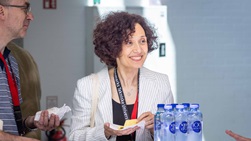
“The WasteEng conference series marks 17 years of breakthrough research and innovation in waste and biomass valorization. Based on 435 submitted abstracts, some 350 oral and poster presentations were provided during the WasteEng2022 conference, showing the richness of this ever-growing field. The presentations contribute significantly to the promotion of sustainable valorization of waste and biomass to produce energy and useful materials, with emphasis on processes and practices that reduce emissions and life cycle assessment of technologies and end-of-pipe products. Moreover, in WasteEng I always enjoy the atmosphere that brings with and the feeling of belonging to an extended scientific family – for all these reasons I am very happy to be the local organizer of WasteEng2022”
Associate Professor Hariklia Gavala, Department of Chemical and Biochemical Engineering, Technical University of Denmark (DTU), Co-Chair of the WasteEng2022 conference.
"“I almost get the feeling that some of my fellow participants might go the DTU cafeteria at any moment, ask for some waste and start an experiment!”"
Professor Gregory Stephanopoulos
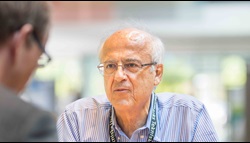 Professor Gregory (Greg) Stephanopoulos, Professor of Chemical Engineering and Biotechnology, MIT, USA, encapsulates the spirit of the WasteEng conference in one sentence. Initiated 17 years ago, WasteEng has become the world’s leading conference on waste and biomass valorization. Venues change, with the Center for Energy Resources Engineering (CERE) and the Department of Chemical and Biochemical Engineering, Technical University of Denmark (DTU), hosting in 2022.
Professor Gregory (Greg) Stephanopoulos, Professor of Chemical Engineering and Biotechnology, MIT, USA, encapsulates the spirit of the WasteEng conference in one sentence. Initiated 17 years ago, WasteEng has become the world’s leading conference on waste and biomass valorization. Venues change, with the Center for Energy Resources Engineering (CERE) and the Department of Chemical and Biochemical Engineering, Technical University of Denmark (DTU), hosting in 2022.
“It is interesting for me, coming from the biological side, to attend a conference with so many approaches present. The scientific content ranges all the way from the molecular level to which types of feedstocks to utilize,” Greg Stephanopoulos continues.
“Moreover, the full range of valorization is covered. In one end of the spectrum, you have high-value products such as pharmaceuticals where the cost of the feedstock is close to insignificant, and in the opposite end you have fuels and commodity chemicals which are very sensitive to cost. While high-value and low-value applications are very different in nature, both types of valorizations are relevant – and addressed at WasteEng.”
More
Mixing different research communities
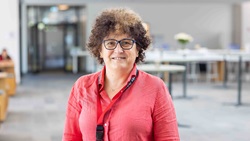 Professor Laurence Le Coq, IMT Atlantique, GEPEA Lab., France, is a veteran at WasteEng, having attended all conferences in the series.
Professor Laurence Le Coq, IMT Atlantique, GEPEA Lab., France, is a veteran at WasteEng, having attended all conferences in the series.
“Being a chemical engineer working in thermochemical conversion, I feel it important to meet researchers in other technology fields. Surely, the thermochemical route is not the only way to achieve valorization of waste. Here, I can meet researchers working in enzymatic, microbial, catalytic, and other routes.”
It is healthy to have an open mind as to which route will be best suited for a given task, Professor Le Coq notes:
“Sometimes the best way forward is to combine different technologies. Tools such as life cycle assessment may aid in this process. A good starting point will always be to take a broad approach to the problem at hand rather than having chosen at technology beforehand. The strength of WasteEng is the way the different research communities are mixed.”
More
Rotation is important
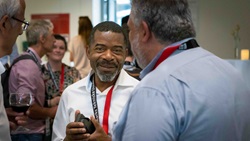 Notably, the size of the conference has remained almost constant over the years. The organizers maintain a ceiling of 400 participants. Still, Professor Ange Nzihou, Founding Chair of the WasteEng conference series, emphasizes that this does not imply the same 400 people meeting year after year:
Notably, the size of the conference has remained almost constant over the years. The organizers maintain a ceiling of 400 participants. Still, Professor Ange Nzihou, Founding Chair of the WasteEng conference series, emphasizes that this does not imply the same 400 people meeting year after year:
“Oh no, rotation is important! As a rule of thumb, we strive to have 60 per cent familiar faces and 40 per cent newcomers. Further, we reserve one third of the spaces for young talents, meaning either PhD or Master students. These are the people who are going to make the changes in the future.”
More
Warm feelings for waste valorization
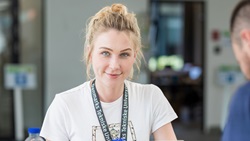 One young participant is Ekaterina Korotenko, PhD student at the University of Chemistry and Technology, Prague, Czech Republic.
One young participant is Ekaterina Korotenko, PhD student at the University of Chemistry and Technology, Prague, Czech Republic.
“What can I say. I love waste!”
Ekaterina Korotenko contributes to the scientific content of the conference with a presentation on valorization of one of the trickiest types of waste: bottom ash from solid waste incineration.
“Fly ashes from incineration do contain many valuable fractions. My presentation today will focus on valorization of salts in the ash. In other projects we focus on metals and on minerals which can be useful in the construction industry. However, in all these contexts several pollutants in the resulting products can be problematic. So, you can look at what we do either as trying to solve hazardous waste problems, or as finding valuable resources. Both are true, it depends on the point of view.”
More
Contributing to sustainable biorefineries
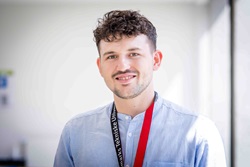 Another WasteEng debutant is Nikolaos Giannakis, PhD student at the Department of Food Science and Human Nutrition, Agricultural University of Athens, Greece. He contributes to the scientific content with a poster on valorization of spent coffee grounds.
Another WasteEng debutant is Nikolaos Giannakis, PhD student at the Department of Food Science and Human Nutrition, Agricultural University of Athens, Greece. He contributes to the scientific content with a poster on valorization of spent coffee grounds.
Through his PhD project, Nikolaos Giannakis hopes to contribute to developing the sustainable biorefineries of the future:
“At this stage it seems that producing for instance biodiesel in this way will not be competitive, due to the low prize of conventional diesel. It might be more feasible to focus on high-end oils, for instance used in cosmetics.”
More
Developing countries participation is crucial
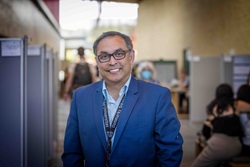 To encourage participation from developing countries, the WasteEng organizers have set up a mechanism. Scientists from developing countries will submit abstracts, and the organizers will award the best entries with grants allowing them to participate. The mechanism is based on funding from the European Union and industry.
To encourage participation from developing countries, the WasteEng organizers have set up a mechanism. Scientists from developing countries will submit abstracts, and the organizers will award the best entries with grants allowing them to participate. The mechanism is based on funding from the European Union and industry.
Professor Animesh Dutta is Director of the Bio-Renewable Innovation Lab, University of Guelph, Canada. He is a fan of the scheme for attracting talents from developing countries:
“What I like most about WasteEng is the global perspective. I do attend other conferences, mainly in either North America or Asia. Normally the focus of these conferences would be the continent where the event in held. While WasteEng is a European conference, only some 50 per cent of the participants are European.”
“I am especially pleased to know that the organizers have a policy to support participation from developing countries. To my mind, this is the way to go. Waste valorization and climate change mitigation are global issues. To tell you the truth, I am certain the conference has a big impact on a global scale,” Professor Dutta adds.
More
A mutual feeling of doing something timely
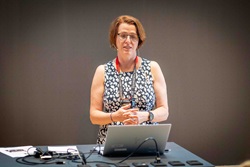 Lisbeth Olsson is Professor in Industrial Biotechnology at Chalmers University of Technology, Sweden. She too stresses the importance of having a global perspective:
Lisbeth Olsson is Professor in Industrial Biotechnology at Chalmers University of Technology, Sweden. She too stresses the importance of having a global perspective:
“I am a regular participant at an international biotech conference held annually in USA. Still, I feel it is also important to get a European perspective.”
To illustrate her point, Lisbeth Olsson compares with petrochemical engineering:
“Fossil oil is pretty much the same regardless of the country where it is produced. In waste valorization, you face very different challenges if you want to process, say, organic waste from production of olive oil, or residues from production of alcohol. Therefore, waste valorization very often has a geographical dimension.”
“At the same time, WasteEng is more holistic than many other conferences. You don’t get very deep into details of specific technologies. Instead, there is a strong focus on developing solutions which can be applied. And what I really find special for this conference is the mutual feeling of doing something which is important for society. Something which is timely – and urgent!”
More
Evident that we meet societal needs
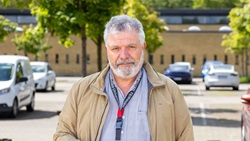 Professor Gerasimos Lyberatos, Director of the Organic Chemical Technology Laboratory, National Technical University of Athens, Greece, has attended all conferences in the WasteEng series.
Professor Gerasimos Lyberatos, Director of the Organic Chemical Technology Laboratory, National Technical University of Athens, Greece, has attended all conferences in the WasteEng series.
“Now is a very exciting time to be in this field. More than ever has it become evident, that what we do meet societal needs. For instance, climate change and lack of energy resources are two driving factors.”
Having attended all conferences over the years, Professor Lyberatos has made the entire journey with WasteEng.
“The structure of the conference has not changed much over the years, but the interest in our field has grown a lot. It has become apparent, that engineering has an important role to play in the current transition. Also, the interest is more international than at the first events. Today, WasteEng is a truly global conference.”
More
Green economy: necessary, but also possible!
So, with a conference buzzing of good vibrations and a mutual feeling of meeting societal needs, wouldn’t it be tempting to expand the conference over the coming years? Not according to Professor Ange Nzihou, Founding Chair of the WasteEng series:
“Well, we could probably easily double the size of the conference, but that is not what we want. Bigger is not always better. I fear we will dilute the main message, the feeling of mutual understanding if we have a huge conference. People know why they are here. The participants may work in separate subfields of waste valorization, but they will all take home the same key messages from the conference.”
So, which key message does Professor Nzihou want participants to take home from WasteEng2022?
“Due to the depletion of natural resources, we need to transition into a green economy. My message would be that this is not only necessary, but also possible. Most of the goods we need can for example be produced from biomass. Of course, production of food should be the top priority, but even after this demand is met it will be possible to have enough renewable raw materials to produce energy, chemicals, and materials. And notably, we may even improve the properties of some materials as we apply renewable feedstocks.”
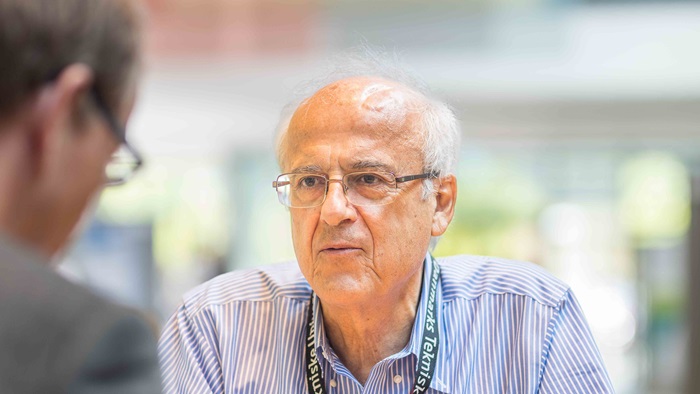 Professor Gregory (Greg) Stephanopoulos, W.H. Dow Professor of Chemical Engineering and Biotechnology, MIT.
Professor Gregory (Greg) Stephanopoulos, W.H. Dow Professor of Chemical Engineering and Biotechnology, MIT.
“It is interesting for me, coming from the biological side, to attend a conference with so many approaches present. The scientific content ranges all the way from the molecular level to which types of feedstocks to utilize.”
“Moreover, the full range of valorization is covered. In one end of the specter, you have high-value products such as pharmaceuticals where the cost of the feedstock is close to insignificant, and in the opposite end you have fuels and commodity chemicals which are very sensitive to cost. While high-value and low-value applications are very different in nature, both types of valorizations are relevant – and addressed at WasteEng.”
Further, Professor Stephanopoulos makes a distinction based on the composure of the waste:
“For solid types of waste materials, you will normally have mechanical or thermochemical treatment, which is not my domain. For the softer types – food waste, certain polymers etc. – microbial treatment is an obvious choice. The main challenge lies in how to engineer the microbes, so they become optimal for the product you want. Finally, we have the gases. Carbon dioxide is very much in focus. Here, the problem is how to make this inert gas accessible for further processing into useful products. The attention right now is on reactions with hydrogen.”
Professor Stephanopoulos attends WasteEng for the first time.
“Compared to your average biotech conference, I find WasteEng to be very hands-on,” he comments, adding with a smile:
“I almost get the feeling that some of my fellow participants might go the DTU cafeteria at any moment, ask for some waste and start an experiment. Okay, that might be an exaggeration, but my point is that people here want to see results in the real world. They will not hesitate to go to the local municipal waste treatment facility to get the raw materials they need for their research.”
-
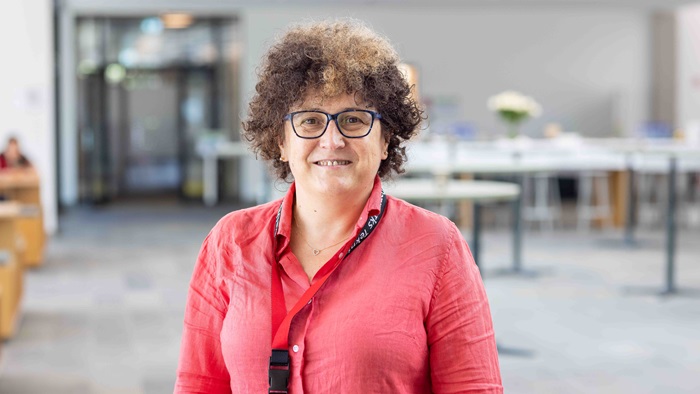 Professor Laurence Le Coq, Dean for Research & Innovation, IMT Atlantique, GEPEA Lab., France. She is a member of the scientific committee for WasteEng2022.
Professor Laurence Le Coq, Dean for Research & Innovation, IMT Atlantique, GEPEA Lab., France. She is a member of the scientific committee for WasteEng2022.
Professor Le Coq is engaged in projects on pollution remediation from combustion flue gas as well as gas treatment from bio-gasification of renewable waste fractions, often with so-called syngas (a mixture of carbon dioxide, hydrogen, and carbon monoxide) as an intermediate product. The development is aimed both at achieving the highest possible purity of the product and at limiting the amounts of specific pollutants.
“Being a chemical engineer working in thermochemical conversion, I feel it important to meet researchers in other technology fields. Surely, the thermochemical route is not the only way to achieve valorization of waste. Here, I can meet researchers working in enzymatic, microbial, catalytic, and other routes. It is healthy to have an open mind as to which route will be best suited for a given task. Sometimes the best way forward is to combine different technologies. Tools such as life cycle assessment may aid in this process. A good starting point will always be to take a broad approach to the problem at hand rather than having chosen at technology beforehand. The strength of WasteEng is the way the different research communities are mixed.”
At IMT Atlantique, Professor Le Coq is already involved in interdisciplinary research.
“However, not all my colleagues work on waste. Therefore, it is good to attend a conference where everybody focusses on waste valorization. I often see some use cases which are relevant to bring home.”
“I have attended all conferences in the series. People here are used to communicate, and many of us know each other well. This makes it easy to discuss new ideas and possible joint projects. Still, I would like to stress that we are not a closed circle. To the contrary, I would argue that way we veterans have bonded over the years makes things easier for newcomers. You may ask any of us and you will be directed to somebody who can answer your question.”
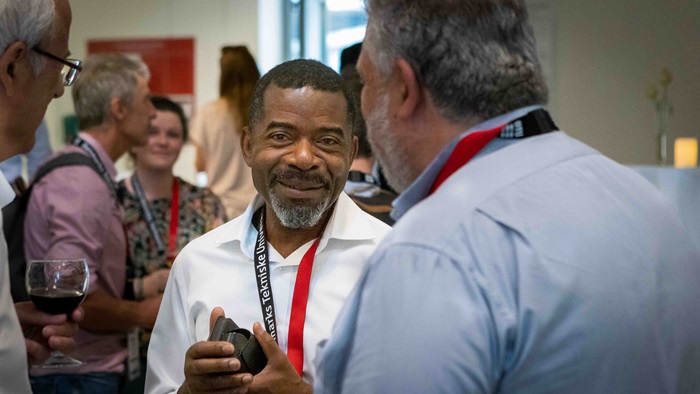 Ange Nzihou, Distinguished Professor of Chemical Engineering at the RAPSODEE Research Center – CNRS, Institut Mines Telecom, IMT Mines Albi, France. Professor Nzihou is the Founding chair of the WasteEng conference series.
Ange Nzihou, Distinguished Professor of Chemical Engineering at the RAPSODEE Research Center – CNRS, Institut Mines Telecom, IMT Mines Albi, France. Professor Nzihou is the Founding chair of the WasteEng conference series.
“Since we began the conference series 17 years ago, we have gradually seen a change in perspective. Back then it was very much about the technologies. Having a given waste fraction, which products would we be able to convert it into – energy, chemicals, materials. Today, we more often start with addressing the usage. This is a completely different approach. I do believe that innovation is more likely to succeed when you take market demands as your starting point.”
One thing which hasn’t changed over the years, however, is the size of the conference. Some years ago, the organizers decided for a ceiling of 400 participants. Still, this does not imply that the same 400 people will meet year after year.
“Oh no, rotation is important! As a rule of thumb, we strive to have 60 per cent familiar faces and 40 per cent newcomers. Further, we reserve one third of the spaces for young talents, meaning either PhD or Master students. These are the people who are going to make the changes in the future. And we find it especially important, that talented young researchers from developing countries can come here. We don’t want this to be a conference only for European and North American researchers.”
To that end, WasteEng has set up a mechanism. Scientists from developing countries will submit abstracts, and the organizers will award the best entries with grants allowing them to participate. The mechanism is based on funding from the European Union.
“Should the EU funding fall short, we will ask for industry sponsorships. This is normally straightforward. Companies like this concept and are happy to support it.”
However, the role of industry is not just supplying funding, Professor Nzihou emphasizes:
“While the WasteEng series is an academic conference, as chemical engineers we do understand that solutions need to be found in collaboration with industry to achieve a socio-economic impact. We need industry to tell us if we are on the right track. Also, I would like to note that of the 450 conference papers, some 15 per cent are from industry.”
Since interest in waste valorization has grown significantly over the latest years, wouldn’t it be tempting to have a bigger conference?
“Well, we could probably easily double the size of the conference, but that is not what we want. Bigger is not always better. I fear we will dilute the main message, the feeling of mutual understanding if we have a huge conference. People know why they are here. The participants may work in separate subfields of waste valorization, but they will all take home the same key messages from the conference.”
So, which key messages will participants take home from WasteEng2022?
“Due to the depletion of natural resources, we need to transition into a green economy. My message would be that this is not only necessary, but also possible. Most of the goods we need can for example be produced from biomass. Of course, production of food should be the top priority, but even after this demand is met it will be possible to have enough renewable raw materials to produce energy, chemicals, and materials. And notably, we may even improve the properties of some materials as we apply renewable feedstocks.”
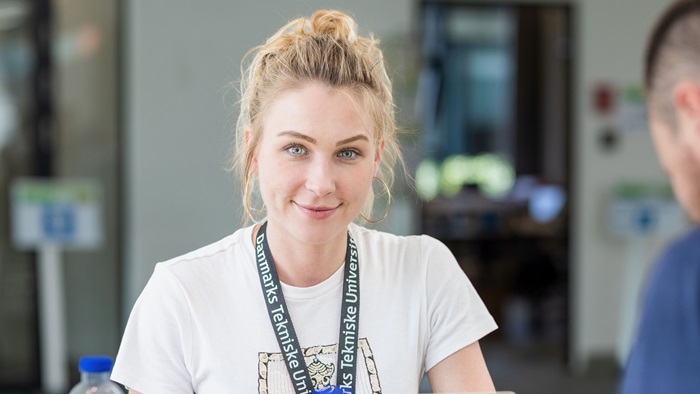 Ekaterina Korotenko is a PhD student at the University of Chemistry and Technology, Prague, Czech Republic. She attends WasteEng for the first time.
Ekaterina Korotenko is a PhD student at the University of Chemistry and Technology, Prague, Czech Republic. She attends WasteEng for the first time.
“What can I say. I love waste!”
Ekaterina Korotenko contributes to the scientific content of the conference with a presentation on valorization of one of the trickiest types of waste: bottom ash from solid waste incineration.
“Fly ashes from incineration do contain many valuable fractions. My presentation today will focus on valorization of salts in the ash. In other projects we focus on metals and on minerals which can be useful in the construction industry. However, in all these contexts several pollutants in the resulting products can be problematic. So, you can look at what we do either as trying to solve hazardous waste problems, or as finding valuable resources. Both are true, it depends on the point of view.”
At the time of the interview, her presentation is due in less than an hour. Laptop open, Ekaterina Korotenko is doublechecking the last details.
“Of course, my colleagues and I look forward to sharing our results and see the reactions from our colleagues.”
The title of the presentation is “Resource recovery from calcium based MSWI (Municipal Solid Waste Incineration) APCr stabilized by water washing”. The talk will be a part of the session on resources recovery.
“Obviously I attend several sessions on resources recovery, but I also like to listen in on presentations from other fields. For instance, this morning I was at a truly fascinating presentation on utilization of plastics waste. This is quite far from my PhD project, but the presentation was just very good, supported by lots of data – exactly what I like!”
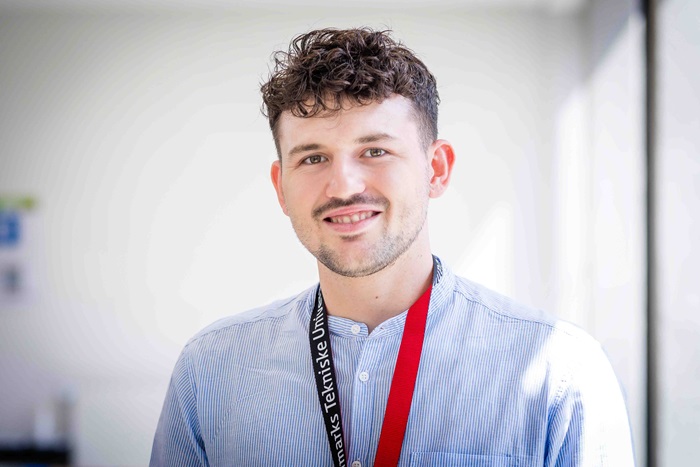 Nikolaos Giannakis is a PhD student at the Department of Food Science and Human Nutrition, Agricultural University of Athens, Greece. He is a chemist with a master’s degree in food science. He attends for the first time.
Nikolaos Giannakis is a PhD student at the Department of Food Science and Human Nutrition, Agricultural University of Athens, Greece. He is a chemist with a master’s degree in food science. He attends for the first time.
“Colleagues told me about WasteEng and suggested for me to attend. I find the conference to be a great place for meeting colleagues and exchanging ideas.”
Nikolaos Giannakis contributes to the scientific content with a poster on valorization of spent coffee grounds. In 2019, over 1.8 million tons of coffee was produced in the EU, leading to more than 330,000 tons of spent grounds from coffee catering services.
“So, there is plenty of raw material for valorization available,” notes Nikolaos.
“Spent coffee grounds are rich in carbohydrates, lipids, phenolic acids, and proteins. Our idea is to produce microbial oil through fermentation of the spent coffee grounds hydrolysate with the microorganism Lipomyces starkeyi. Further, we separate the high value product from the grounds and undertake hydrolysis of the product with enzymes.”
The project is a contribution to developing the sustainable biorefineries of the future.
“At this stage it seems that producing for instance biodiesel in this way will not be competitive, due to the low prize of conventional diesel. It might be more feasible to focus on high-end oils, for instance used in cosmetics.”
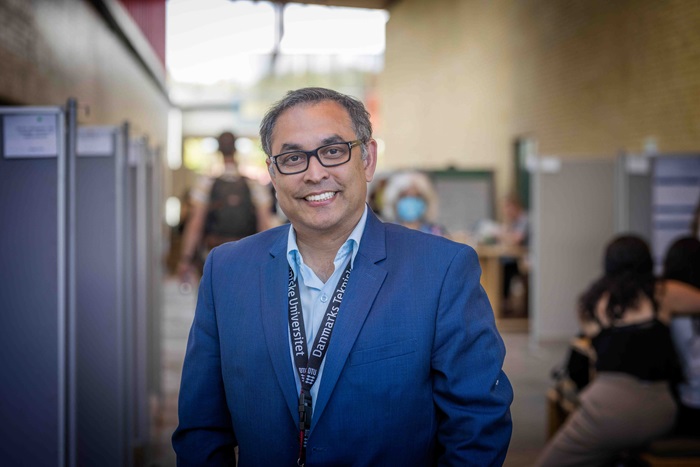 Professor Animesh Dutta, Director of the Bio-Renewable Innovation Lab, University of Guelph, Canada.
Professor Animesh Dutta, Director of the Bio-Renewable Innovation Lab, University of Guelph, Canada.
“Guelph being the leading agricultural university in Canada, conversion of biomass is a major topic for us, and that has been my field for the last 20 years.”
“As for valorization of waste, in this case agricultural waste products, I would like to distinguish between before and after COVID. Just a few years ago, the focus on climate change, reduction of CO2 emissions etc. was very high. However, this shifted due to the pandemic. Suddenly, we were dealing with a threat to the survival of the human civilization, and for good reason developing a vaccine became the dominant task.”
“Now, as the pandemic seems to be under reasonably good control, we can see focus beginning to be redirected towards sustainability, including waste valorization.”
“From an environmental point of view the pandemic did have some effects in both ways. I am thinking about the reduction of pollution from aviation, less cars on the roads etc. But we need to remember that this impression of a reduced level of pollution is only temporary. In contrary, it has contributed in generating a huge amount of plastic wastes where efficient disposal is a major challenge.”
“I do believe that some effects from the lockdown period will remain. For example, conducting business meetings remotely instead of travelling. Just looking at my daughter, I can see how chatting with friends online has become a big part of everyday life, often replacing being together physically. Still, we are human beings. We do need to meet face-to-face occasionally. For instance, at a conference like this one.”
“What I like most about WasteEng is the global perspective. I do attend other conferences, mainly in either North America or Asia. Normally the focus of these conferences would be the continent where the event in held. While WasteEng is a European conference, only some 50 per cent of the participants are European.”
“Most importantly, the conference discusses research results, as well as applications that focuses on cutting-edge R&D and addressing barriers related to the chemical, bio-chemical and thermo-chemical conversion of biomass, co-products and bio-waste into fuels, energy to added-value materials. Being a top-tier research university in biomass and waste conversion, DTU is an ideal place to re-start the WasteEng conference series physically after a long 4 years.”
“I am especially pleased to know that the organizers have a policy to support participation from developing countries. To my mind, this is the way to go. Waste valorization and climate change mitigation are global issues. To tell you the truth, I am certain the conference has a big impact on a global scale.”
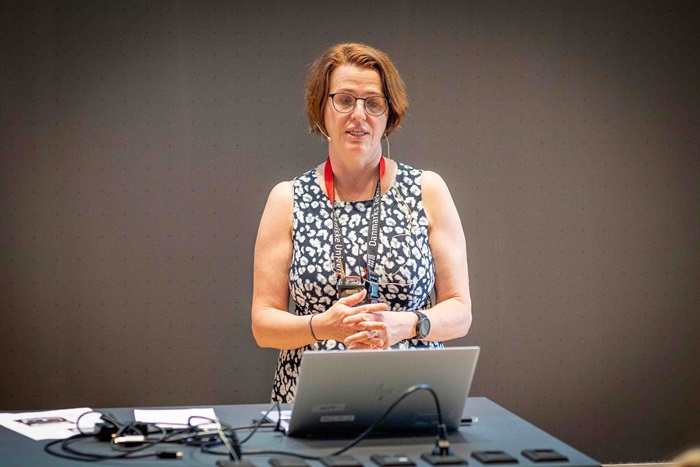 Lisbeth Olsson, Professor in Industrial Biotechnology, Department of Biology and Biological Engineering, Chalmers University of Technology, Gothenburg, Sweden.
Lisbeth Olsson, Professor in Industrial Biotechnology, Department of Biology and Biological Engineering, Chalmers University of Technology, Gothenburg, Sweden.
“My focus is on design and use of enzymes and microorganisms in processes where plant cell wall material is converted to fuels, chemicals, and material. My main motivation is that the scientific advances can be applied to solutions which meet societal needs. This is very much the case for valorization of waste.”
Lisbeth Olsson attends the WasteEng conference for the first time.
“I am a regular participant at an international conference – Symposium on Biomaterials, Fuels and Chemicals - which is held annually in USA. Still, I feel it is also important to get a European perspective.”
To illustrate her point on the challenges of waste engineering, Lisbeth Olsson compares with petrochemical engineering:
“Fossil oil is pretty much the same regardless of the country where it is produced. In waste valorization, you face very different challenges if you want to process, say, organic waste from production of olive oil, or residues from production of alcohol. Therefore, waste valorization very often has a geographical dimension.”
“At the same time, it becomes increasingly important in waste valorization to work across disciplines. WasteEng is more holistic than many other conferences. You don’t get very deep into details of specific technologies. Instead, there is a strong focus on developing solutions which can be applied.”
“Also, I am pleased to see a large contingent of young participants. Especially after the pandemic, it is nice to see that young researchers can attend physical events again and build networks.”
So, you find the atmosphere of WasteEng to be very openminded?
“I do, but then I have never been to a scientific conference where people were not openminded. What I really find special for this conference is the mutual feeling of doing something which is important for society. Something which is timely – and urgent!”
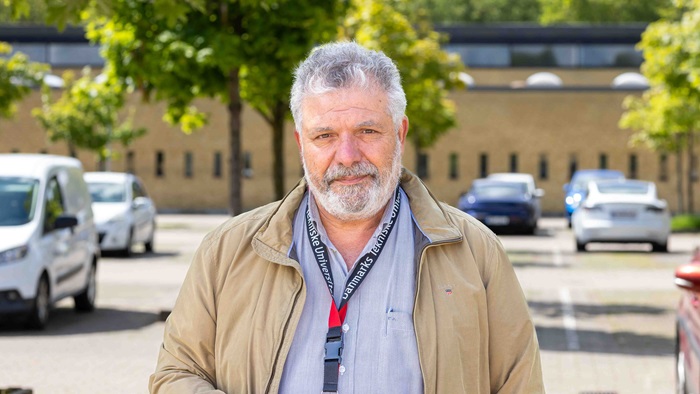 Professor Gerasimos Lyberatos, Director, Organic Chemical Technology Laboratory, National Technical University of Athens. Professor Lyberatos is a member of the scientific committee for WasteEng2022.
Professor Gerasimos Lyberatos, Director, Organic Chemical Technology Laboratory, National Technical University of Athens. Professor Lyberatos is a member of the scientific committee for WasteEng2022.
“Now is a very exciting time to be in this field. More than ever has it become evident, that what we do meet societal needs. For instance, climate change and lack of energy resources are two driving factors.”
“Being a chemical engineer, I feel a shift in the focus. During the 20th century, we developed a range of technologies which helped in making everyday life easier. Plastics, just to name one example. Now we face the next big challenge. If the modern lifestyle is to be maintained in a sustainable way, we need to reinvent all our technologies.”
“For a long time, we have been operating a linear economy. Goods were produced, and later dumped as waste. 30 years ago, the focus was on how to dispose of this waste in a safe manner. Today, we want to create a circular economy. What we do has a dual purpose. We want to bring down the amounts of waste, but we also want to create new resources. Hopefully, the word “waste” will soon become redundant!”
Having attended all WasteEng conferences, Professor Lyberatos is a veteran participant.
“The structure of the conference has not changed much over the years, but the interest in our field has grown a lot. It has become apparent, that engineering has an important role to play in the current transition. Also, the interest is more international than at the first events. Today, WasteEng is a truly global conference.”
“What I like about the format is that it is not too specialized. A wide range of technologies are represented, for example biological, thermochemical, and catalytic transformation techniques. Often these fields would have their own dedicated conferences. Here, all are represented. This allows for contacts across the different fields, and for discussions on possible hybrid solutions.”